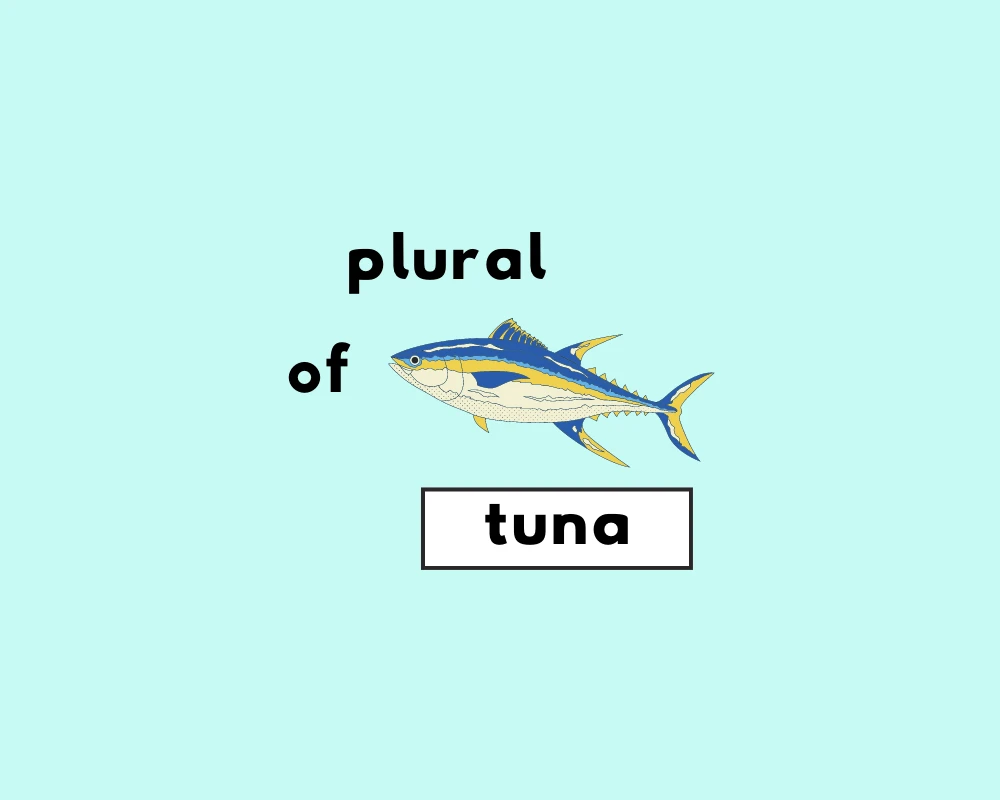What’s the plural of “tuna”?
The plural of tuna is tuna. Sometimes tunas is accepted as the plural of tuna. This is the case when referring to a collection of tuna, or to numerous types of species of tunas within the tuna family.
The fisherman caught a huge tuna.
We saw a school of tuna swimming near the boat.
The fish market had several large tunas for sale.
I saw two deers grazing in the meadow.
What’s the singular of tuna?
Tuna is singular.
What does the word tuna mean?
The word tuna is understood as:
Any of numerous large vigorous scombroid food and sport fishes (such as an albacore or a bluefin tuna).
Tuna’s plural, associate “school of tuna” with the image of many tuna swimming together; the singular and plural are the same unless referring to multiple species.
Nouns that stay the same singular and plural
Some nouns show no change between their plural and singular forms. See the chart of the following nouns that do not change to demonstrate singular or plural forms:
| singular | plural |
| tuna | tuna |
| moose | moose |
| fish | fish (sometimes fishes) |
| elk | elk |
| deer | deer |
| bison | bison (or bisons) |
The word tuna used in sentences
1. Eat oily fish such as sardines, salmon, and tuna at least twice a week.
2. The water which surrounds the island is a rich fishing ground for tuna and mackerel.
3. Rolling up his sleeves, handling tuna on the factory conveyor belt and urging workers on are not beneath this boss.
4. The figure is further halved in canned tuna.
5. Instead, tuna are taken from the wild, enclosed in nets and dragged to shore where they are corralled in pens and fattened on an oil-rich diet.
Origin of the word tuna
From etymology online on tuna (n.):
1881, from American Spanish (California) tuna, from Spanish atun, from Arabic tun, borrowed, probably in Spain, from Latin thunnus “tunny”.
What’s the difference between they’re, their, and there?
Work Sheet
According to the blog post, what is the standard plural form of the word “tuna”?
When is it generally accepted to use “tunas” as the plural, according to the post?
Which of the following sentences correctly uses the standard plural form of “tuna” as described in the post?
The blog post lists other nouns that have the same singular and plural form. Which of these is *not* mentioned in the list?
According to the blog post, what is the singular form of the word “tuna”?
We observed a large school of swimming in the ocean.
The shop sold several types of , including albacore and bluefin.
The fisherman caught a single large .
According to the post, the plural form of is the same as its singular form.
Rolling up his sleeves, handling on the factory conveyor belt and urging workers on are not beneath this boss.
Frequently Asked Questions
What’s the plural of “tuna”?
+
When is “tunas” acceptable?
+
Is “tuna” used for singular?
+
How is standard plural used?
+
Are other words like “tuna”?
+
Yash, D. "What’s the Plural of Tuna?." Grammarflex, Jun 20, 2025, https://www.grammarflex.com/whats-the-plural-of-tuna/.
Sources
-
Definition of tuna.











